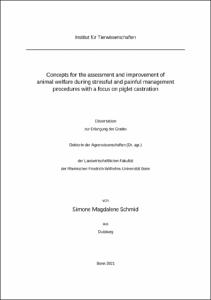Schmid, Simone Magdalene: Concepts for the assessment and improvement of animal welfare during stressful and painful management procedures with a focus on piglet castration. - Bonn, 2021. - Dissertation, Rheinische Friedrich-Wilhelms-Universität Bonn.
Online-Ausgabe in bonndoc: https://nbn-resolving.org/urn:nbn:de:hbz:5-63617
Online-Ausgabe in bonndoc: https://nbn-resolving.org/urn:nbn:de:hbz:5-63617
@phdthesis{handle:20.500.11811/9294,
urn: https://nbn-resolving.org/urn:nbn:de:hbz:5-63617,
author = {{Simone Magdalene Schmid}},
title = {Concepts for the assessment and improvement of animal welfare during stressful and painful management procedures with a focus on piglet castration},
school = {Rheinische Friedrich-Wilhelms-Universität Bonn},
year = 2021,
month = sep,
note = {The welfare of farm animals is a topic of rising importance to consumers and livestock owners. Many procedures that are routinely performed in young livestock, for example the surgical castration of piglets, are considered to be stressful and painful for the animals. In Germany, a stricter legislation was adopted prescribing the use of analgesia and anesthesia for castration, which has a significant impact on production and management processes. Although alternatives for castration without anesthesia are available, scientific recommendations for their successful implementation into practice are often lacking. It was therefore the aim of this thesis to develop concepts for the assessment and improvement of animal welfare during stressful and painful management procedures, while the focus lay on piglet castration. An extensive literature research was conducted to identify frequently used approaches and indicators for the assessment of stress and pain and to analyze the impact of routinely performed procedures on piglets. Several research gaps relating to the appropriate piglet age and processing techniques were uncovered, especially regarding the marking of piglets. Castration was identified as the most stressful and painful procedure when compared to teeth resection, tail docking or marking. With a survey among German pig farmers a detailed overview of current management practices regarding the castration process was generated. A large heterogeneity between farms was detected. The survey results showed that the tearing of tissues is still applied during castration, although it is forbidden in the EU, confirming previous studies. As little information is available on the consequences of this procedure on animal welfare, different techniques were compared in field trials. From behavior, vocalizations and the amount of removed tissues it can be concluded that piglets experienced more stress and pain when the castration is performed by tearing. In additional field trials, the welfare of piglets during the general anesthesia applied by injection was evaluated by monitoring body temperatures, respiration and behavior. Anesthetized piglets need to be separated in warmed, immovable containers during the recovery from anesthesia to prevent life-threatening cooling or losses due to crushing. As body temperatures are an important indicator of piglet welfare, different thermometers were tested. Especially infrared ear thermometers seem to be a suitable alternative to the more invasive rectal measurements. Welfare of piglets can be significantly improved when the findings of this thesis, especially with regard to the castration technique and the monitoring of piglets during recovery from anesthesia, will be implemented into daily practice. For this, knowledge transfer and training of stockpersons is essential.},
url = {https://hdl.handle.net/20.500.11811/9294}
}
urn: https://nbn-resolving.org/urn:nbn:de:hbz:5-63617,
author = {{Simone Magdalene Schmid}},
title = {Concepts for the assessment and improvement of animal welfare during stressful and painful management procedures with a focus on piglet castration},
school = {Rheinische Friedrich-Wilhelms-Universität Bonn},
year = 2021,
month = sep,
note = {The welfare of farm animals is a topic of rising importance to consumers and livestock owners. Many procedures that are routinely performed in young livestock, for example the surgical castration of piglets, are considered to be stressful and painful for the animals. In Germany, a stricter legislation was adopted prescribing the use of analgesia and anesthesia for castration, which has a significant impact on production and management processes. Although alternatives for castration without anesthesia are available, scientific recommendations for their successful implementation into practice are often lacking. It was therefore the aim of this thesis to develop concepts for the assessment and improvement of animal welfare during stressful and painful management procedures, while the focus lay on piglet castration. An extensive literature research was conducted to identify frequently used approaches and indicators for the assessment of stress and pain and to analyze the impact of routinely performed procedures on piglets. Several research gaps relating to the appropriate piglet age and processing techniques were uncovered, especially regarding the marking of piglets. Castration was identified as the most stressful and painful procedure when compared to teeth resection, tail docking or marking. With a survey among German pig farmers a detailed overview of current management practices regarding the castration process was generated. A large heterogeneity between farms was detected. The survey results showed that the tearing of tissues is still applied during castration, although it is forbidden in the EU, confirming previous studies. As little information is available on the consequences of this procedure on animal welfare, different techniques were compared in field trials. From behavior, vocalizations and the amount of removed tissues it can be concluded that piglets experienced more stress and pain when the castration is performed by tearing. In additional field trials, the welfare of piglets during the general anesthesia applied by injection was evaluated by monitoring body temperatures, respiration and behavior. Anesthetized piglets need to be separated in warmed, immovable containers during the recovery from anesthesia to prevent life-threatening cooling or losses due to crushing. As body temperatures are an important indicator of piglet welfare, different thermometers were tested. Especially infrared ear thermometers seem to be a suitable alternative to the more invasive rectal measurements. Welfare of piglets can be significantly improved when the findings of this thesis, especially with regard to the castration technique and the monitoring of piglets during recovery from anesthesia, will be implemented into daily practice. For this, knowledge transfer and training of stockpersons is essential.},
url = {https://hdl.handle.net/20.500.11811/9294}
}






